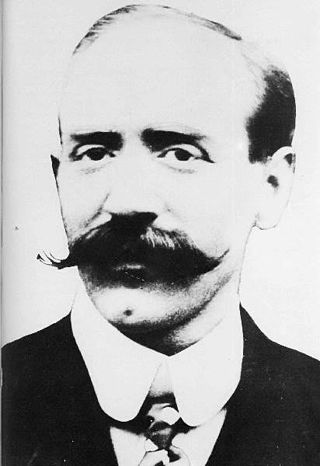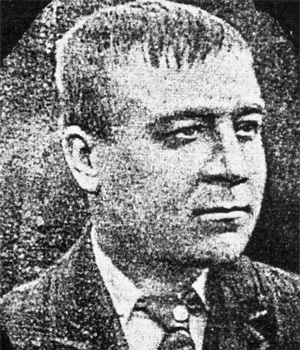Related Research Articles

Albert Pierrepoint was an English hangman who executed between 435 and 600 people in a 25-year career that ended in 1956. His father Henry and uncle Thomas were official hangmen before him.
Harry Bernard Allen was one of Britain's last official executioners, officiating between 1941 and 1964. He was chief executioner at 41 executions and acted as assistant executioner at 53 others, at various prisons in England, Scotland, Northern Ireland, the Channel Islands and Cyprus. He acted as assistant executioner for 14 years, mostly to Albert Pierrepoint from 1941 to 1955.

An executioner, also known as a hangman or headsman, is an official who effects a sentence of capital punishment on a legally condemned person.

John Ellis was a British executioner for 23 years, from 1901 to 1924. His other occupations were as a Rochdale hairdresser and newsagent.
James Inglis was a Scottish man executed for murder, at the age of 29.

Henry Albert Pierrepoint was an English executioner from 1901 until 1910. He was the father of Albert Pierrepoint and brother of Thomas William Pierrepoint.
Thomas William Pierrepoint was an English executioner from 1906 until 1946. He was the brother of Henry Pierrepoint and uncle of Albert Pierrepoint.
James Berry was an English executioner from 1884 until 1891. Berry was born in Heckmondwike in the West Riding of Yorkshire, where his father worked as a wool-stapler. His most important contribution to the science of hanging was his refinement of the long drop method developed by William Marwood, whom Berry knew quite well. His improvements were intended to diminish mental and physical suffering and some of them remained standard practice until the abolition of capital punishment for murder.
Albert Pierrepoint (1905–1992) was the most prolific British hangman of the twentieth century, executing 434 men and women between 1932 and 1955. This table records the locations of each of the executions he participated in, the numbers in brackets being the number of executions he was assistant executioner at, the other numbers are those in which he officiated as chief executioner.

HM Prison Swansea is a Category B/C men's prison, located in the Sandfields area of Swansea, Wales. The prison is operated by His Majesty's Prison Service, and is colloquially known as 'Cox's farm', after a former governor.

William Calcraft was a 19th-century English hangman, one of the most prolific of British executioners. It is estimated in his 45-year career he carried out 450 executions. A cobbler by trade, Calcraft was initially recruited to flog juvenile offenders held in Newgate Prison. While selling meat pies on streets around the prison, Calcraft met the City of London's hangman, John Foxton.

James Billington was a hangman for the British government from 1884 until 1901. He was the patriarch of the Billington family of executioners. Billington died at home from emphysema in the early hours of 13 December 1901, ten days after having executed Patrick McKenna, a man he knew well.
Bartholomew Binns (1839–1911) was an English executioner from November 1883 to March 1884. When William Marwood died on 4 September 1883 after a brief illness, Binns was appointed to the position of Executioner for the City of London and Middlesex. Before becoming hangman, Binns was employed as foreman platelayer at Dewsbury by the Lancashire and Yorkshire Railway Company, but after he got the post he no longer worked anywhere.
Thomas Billington was an English executioner from 1897 to 1901 and was one of four family members who worked in the occupation.
Thomas George Tattersall was an English plasterer who was convicted of murdering his wife.
John Billington was an English executioner. He was on the Home Office list from 1901 to 1905.

William Billington was an English executioner. He was on the Home Office list from 1902 to 1905 and had participated in hangings from 1899.
Robert Orridge Baxter was an English executioner from Hertfordshire. His career lasted from 1915 to 1935, during which he carried out 44 hangings and assisted at 53 others.
Alfred Allen was an English executioner from Wolverhampton. His career lasted from 1928 to 1937, during which he carried out 3 hangings as a chief executioner and assisted at 14 others.
Stanley William Cross was an English executioner from Wormwood Scrubs. His career lasted from 1932 to 1941, during which he carried out four hangings as a chief executioner and assisted at 20 others.
References
- 1 2 "The English hangmen 1850 - 1964". capitalpunishmentuk.org. Retrieved 2010-10-31.
- 1 2 Fielding, Steve (2008). The Executioner's Bible: The Story of Every British Hangman of the Twentieth Century . John Blake. p. 37.
- ↑ Fielding, Steve (1994). Hangman's Record, Volume 1; Volumes 1868–1899. Chancery House. p. xxvii.
- 1 2 3 4 "Victorian Murder Cases: Elijah Winstanley - Wigan 17/12/1895". truecrimelibrary.com. Retrieved 2010-10-31.
- ↑ Fielding (2008), pp. 263-264.
- ↑ Fielding (2008), p. 44.